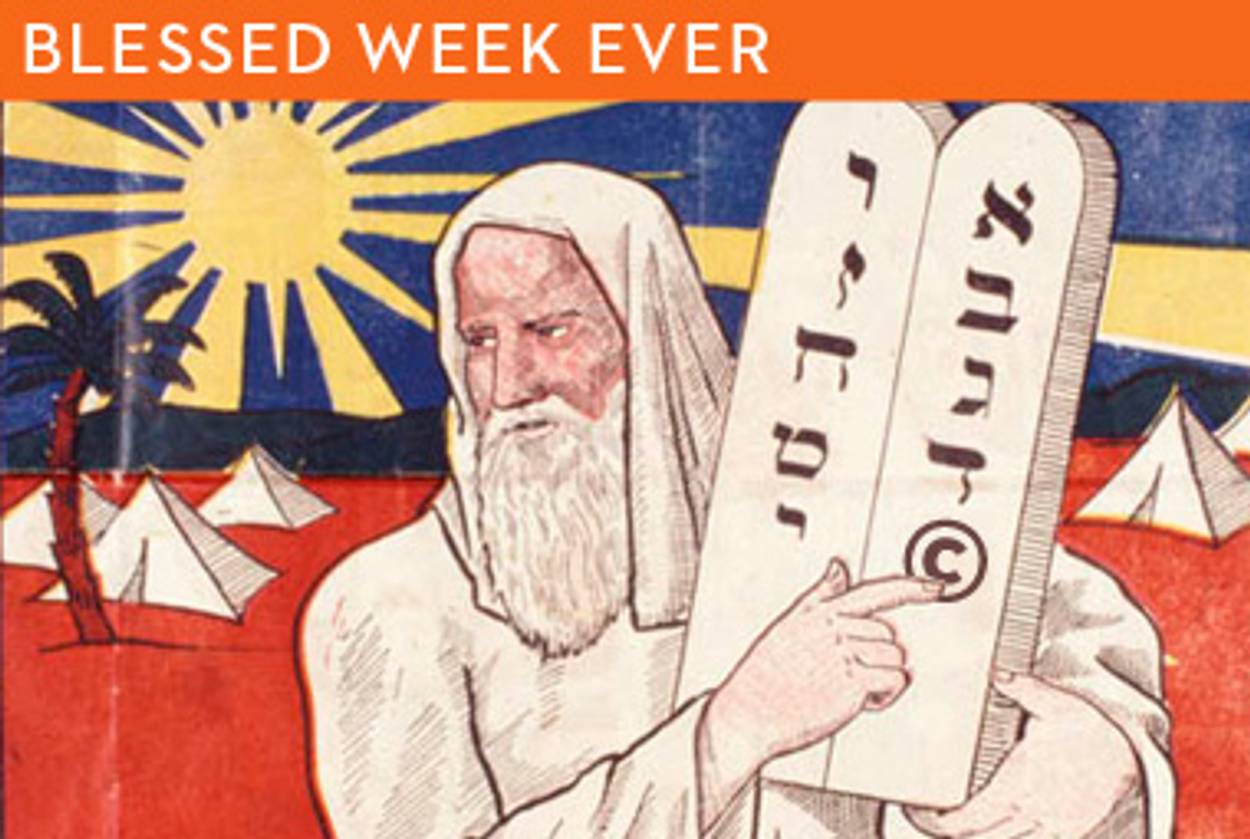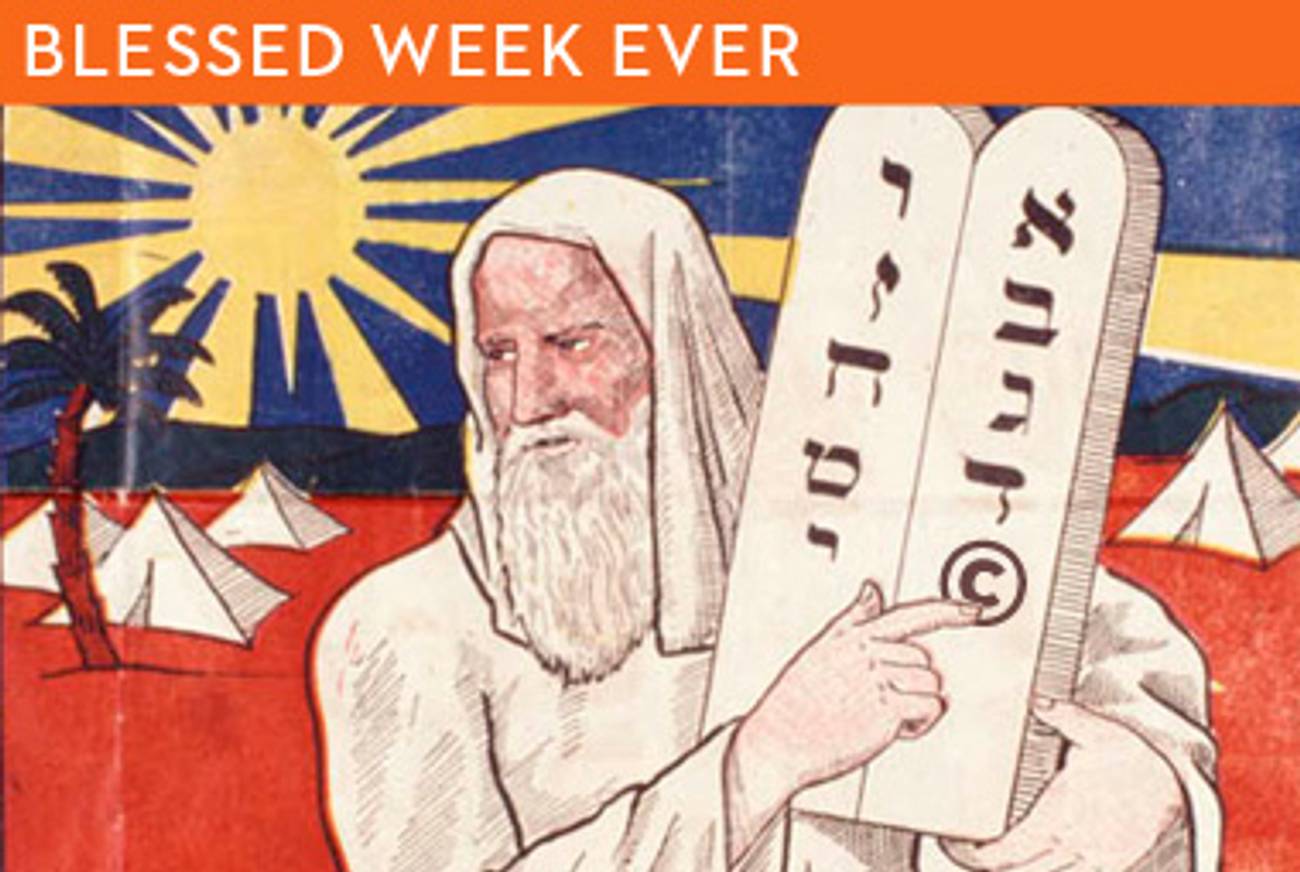Copy That
Moses, the hero of this week’s parasha, knew about the importance of the public domain, in which shared stories shape common consciousness. But today we’re much more interested in private profit.




Here’s the story told in this week’s parasha: After the Lord afflicts Egypt with several more plagues, the Pharaoh is finally ready to release the Israelites, who, in turn, leave in such haste they haven’t time to wait for their bread to leaven.
It’s a familiar story, of course—most of us spend one or two nights a year munching on matzoh, reclining, and retelling this tale to our families and friends—and it’s familiar by design. “Remember this day,” Moses tells his flock, “when you went out of Egypt, out of the house of bondage, for with a mighty hand, the Lord took you out of here.” It’s more than a passing suggestion: We are all commanded to speak of the Exodus each year, to introduce it to the next generation, to keep the collective memory vividly alive.
Taken literally, this is a strange demand. Shouldn’t memory, like the moon affecting the tide, take its natural toll on the heart and the mind alike? Shouldn’t we be allowed to remember what we want to remember and forget what we want to forget? This, surely, is true of individuals; but once a collection of selves congregates and contemplates peoplehood, the rules change. A people needs a story, upon which nations are founded and according to which history is understood. In his renowned book Imagined Communities, Cornell professor Benedict Anderson argued that America invented the notion of nationalism, creating a shared narrative powerful enough to bind together men and women who hailed from different parts of the world, lived in different parts of the country, and believed in different religious and political ideals.
In this week’s parasha, we see the same principle at work. As they prepare to flee Egypt, the Israelites are still a loose collection of clans, sharing little but common ancestry and the brunt of Egypt’s burden. But in the story of the exodus, and in the commandment to retell it in perpetuity, they have found the platform for peoplehood. Sharing a story is often much more meaningful than sharing DNA.
This idea, incidentally, is also the basis for our copyright laws. And it is everywhere under attack. While our current copyright laws, for example, allow copyright-holders to seek redress from individuals guilty of specific copyright infringement, a new bill that is likely to pass into law soon would give the government the right to shut down an entire website if the website was “dedicated to infringing activities.” The law, called the Combating Online Infringement and Counterfeit Act of 2010, does not specify precisely what such dedication might mean, giving corporations a powerful tool to use not only against legitimate offenders but also against competing corporate entities. The recent case of Viacom v. YouTube, for example, would most likely have ended very differently had the media conglomerate had legal grounds to argue that the web video giant, despite all efforts to remove unlicensed content, still harbored many infringing materials and should therefore be shut down.
This is a perilous state of affairs, one that stands in direct contradiction to the original intent behind copyright law. Passed in 1710, the world’s first piece of copyright legislation, known as the Statute of Anne after the queen to which it was presented, makes this point explicitly. The law’s full title was “An Act for the Encouragement of Learning, by vesting the Copies of Printed Books in the Authors or purchasers of such Copies, during the Times therein mentioned.” It’s a mouthful, but it gets the point across: Rather than grant authors or publishers perpetual ownership of their creations, as had been the case for decades, the law required that all works be made available to the public after a certain period of time, for the benefit of the common good. It is no coincidence that the statute came only a few short decades after John Locke’s Two Treatises of Government; if, as Locke famously argued, the only legitimate governments are those who govern by consent of the people, then the people must be educated. For that to happen, they need access to shared resources, an interest that trumps even that of private property. So was born the public domain.
Unfortunately, in the hands of lobbyists and legislators, this noble idea dies a little each year. When Charles Pinckney of South Carolina and James Madison of Virginia drafted the nation’s first copyright law in 1790, they were content with giving authors the rights to their work for 28 years; by 1998, the term limit has climbed as high as life of the author plus an additional 70 years. This grants creators and publishers excessive protection, leaving the rest of us with a staid and struggling public domain.
As we read this week’s parasha, then, let us be reminded once more of the importance of shared stories, and let us zealously guard those shared spaces that corporations, politicians, and other interested parties are forever trying to make private and profitable. Without such common resources, without a public domain, what we have is not a culture but a marketplace. Emma Goldman, whose work entered the public domain this week, said it best. “Heaven,” she quipped, “must be an awfully dull place if the poor in spirit live there.” Let us struggle to make sure that is never the case.
Liel Leibovitz is a senior writer for Tablet Magazine and a host of the Unorthodox podcast.
Liel Leibovitz is editor-at-large for Tablet Magazine and a host of its weekly culture podcast Unorthodox and daily Talmud podcast Take One. He is the editor of Zionism: The Tablet Guide.